History
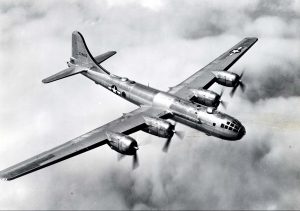 Since my dad was in the Army Air Forces in World War II, the B-17 is a plane that I have researched, watched documentaries and movies about, and toured. The B-17 was called the Flying Fortress, and my dad always said that it was a very safe plane. Nevertheless, as much as I love the B-17 Bomber, there are other war planes that were also stars of World War II. Sometimes, I think that I forget about all those others planes.
Since my dad was in the Army Air Forces in World War II, the B-17 is a plane that I have researched, watched documentaries and movies about, and toured. The B-17 was called the Flying Fortress, and my dad always said that it was a very safe plane. Nevertheless, as much as I love the B-17 Bomber, there are other war planes that were also stars of World War II. Sometimes, I think that I forget about all those others planes.
One of those planes, the B-29 Superfortress actually made its debut flight in Seattle Washington on this day, September 21, 1942. The B-29 was the largest bomber used in World War II, by any nation. The B-29 was the brain child of General Hap Arnold, back in 1939. Arnold worried that a German victory in Europe would mean the United States would have no bases on the eastern side of the Atlantic from which to counterattack. They needed a plane that could travel faster, farther, and higher than anything that was available then. Taking on the challenge, Boeing set out to create such a plane.
The plane they came up with was amazing. It could carry loads that were nearly its own weight and at altitudes 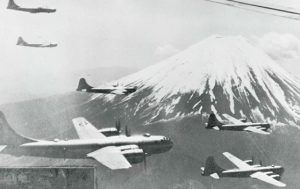 of 30,000 to 40,000 feet. The plane boasted a pilot console in the rear of the plane, capable of running the plane in the event the front pilot was knocked out of commission. It also had the first radar bombing system of any US bomber. While the Superfortress first took flight on September 21, 1942, it would not make its bombing debut until June 5, 1944, in a battle against Bangkok, as the Allies prepared to liberate Burma from the hands of the Japanese. Then a little over a week later, it was used against mainland Japan on June 14, when 60 B-29s based in Chengtu, China were used to bomb an iron and steel works factory on Honshu Island. It wasn’t exactly a successful mission, but it did boost the morale of the Americans.
of 30,000 to 40,000 feet. The plane boasted a pilot console in the rear of the plane, capable of running the plane in the event the front pilot was knocked out of commission. It also had the first radar bombing system of any US bomber. While the Superfortress first took flight on September 21, 1942, it would not make its bombing debut until June 5, 1944, in a battle against Bangkok, as the Allies prepared to liberate Burma from the hands of the Japanese. Then a little over a week later, it was used against mainland Japan on June 14, when 60 B-29s based in Chengtu, China were used to bomb an iron and steel works factory on Honshu Island. It wasn’t exactly a successful mission, but it did boost the morale of the Americans.
The United States recaptured the Marianas Islands in the South Pacific, because they were the perfect location for air bases for the new B-29s to strike mainland Japan on a consistent basis. When the bases were up and 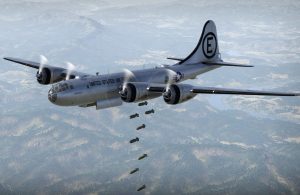 running, they were used to coordinate a series of bombing raids against Tokyo. While the B-29s were capable of precision bombing at high altitudes, they began dropping incendiary devices from a mere 5,000 feet, firebombing the Japanese capital attempting to break the will of the Axis power. One raid, in March 1945, killed more than 80,000 people. But for the Superfortress, the most famous use would happen in August. It was the only plane capable of delivering a 10,000 pound bomb…the atomic bomb. The Enola Gay took off on August 6th and the Bock’s Car took off on August 9th both from the Marianas, and flew into history. Of course, we all hope that such a bomb run would never be necessary again, but if it had been, it was good to know it was available.
running, they were used to coordinate a series of bombing raids against Tokyo. While the B-29s were capable of precision bombing at high altitudes, they began dropping incendiary devices from a mere 5,000 feet, firebombing the Japanese capital attempting to break the will of the Axis power. One raid, in March 1945, killed more than 80,000 people. But for the Superfortress, the most famous use would happen in August. It was the only plane capable of delivering a 10,000 pound bomb…the atomic bomb. The Enola Gay took off on August 6th and the Bock’s Car took off on August 9th both from the Marianas, and flew into history. Of course, we all hope that such a bomb run would never be necessary again, but if it had been, it was good to know it was available.
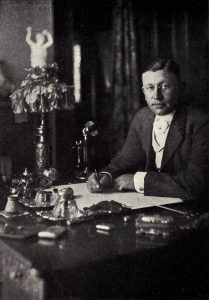 I think that most of us have engaged in a wager or two…probably more in fact. For most of us gambling brings little or no gain, and instead, usually loss. That is what it would bring for Horatio Nelson Jackson, as he, to his own folly, accepted a $50.00 bar bet, back in 1903. At that time, there were roads for the cars that were coming out, but they were…well, rough, and that’s an understatement. Unpaved dirt roads are notoriously dusty, rutted, and muddy in the rain. Most people, at that time, considered the automobile a passing novelty, too unreliable to survive a trip across America, but Jackson argued that they were wrong. As often happens in these barroom discussions, someone called Jackson out on his theory. He bet Jackson that he could not drive a car from San Francisco, California to New York City, New York in 90 days. Jackson accepted the challenge.
I think that most of us have engaged in a wager or two…probably more in fact. For most of us gambling brings little or no gain, and instead, usually loss. That is what it would bring for Horatio Nelson Jackson, as he, to his own folly, accepted a $50.00 bar bet, back in 1903. At that time, there were roads for the cars that were coming out, but they were…well, rough, and that’s an understatement. Unpaved dirt roads are notoriously dusty, rutted, and muddy in the rain. Most people, at that time, considered the automobile a passing novelty, too unreliable to survive a trip across America, but Jackson argued that they were wrong. As often happens in these barroom discussions, someone called Jackson out on his theory. He bet Jackson that he could not drive a car from San Francisco, California to New York City, New York in 90 days. Jackson accepted the challenge.
Jackson asked Sewall Crocker to accompany him on the trip. Crocker was a 22 year old former bicycle racer and a gasoline engine mechanic. Jackson was a doctor who had given up his medical practice after a bout of tuberculosis. At this point, he was looking for adventure. Crocker suggested that the former physician purchase a used 20 horsepower Winton touring car for the treacherous journey, so Jackson did, and named it the “Vermont.” Then on May 23, 1903, the two men hopped in and headed east. They had packed sleeping bags, food, and other camping supplies. Previous cross country trips had all ended in failure, and it was likely that this one would suffer a similar fate, but this was to be the first successful cross country road trip.
Horatio Jackson had little driving experience, and no mechanical knowledge, but he had his wife’s inherited fortune, and apparently that was burning a hole in he pockets. The roads he was to be on had no road signs, 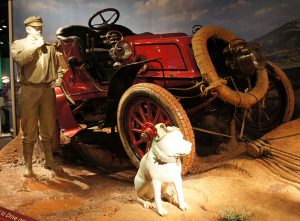 there was no GPS, and more importantly, there were no gas stations…plus the fact that automobiles were prone to breakdowns. The Vermont was no different, the first pit stop was just 15 miles into the trip when they blew a tire. There would be many others. Nevertheless, Jackson would win his bar bet and the $50.00 when he rolled into New York City. The mud caked Vermont, crawled down Manhattan’s deserted Fifth Avenue at 4:30 am on Sunday, July 26. The approximately 4,500 mile journey had taken 63 days, 12 hours and 30 minutes, amazing considering all the problems. So what then was the road trip folly? Just this…Jackson had won his wager with nearly a month to spare, but it cost him $8,000 in the process. I guess he could always say he made the trip.
there was no GPS, and more importantly, there were no gas stations…plus the fact that automobiles were prone to breakdowns. The Vermont was no different, the first pit stop was just 15 miles into the trip when they blew a tire. There would be many others. Nevertheless, Jackson would win his bar bet and the $50.00 when he rolled into New York City. The mud caked Vermont, crawled down Manhattan’s deserted Fifth Avenue at 4:30 am on Sunday, July 26. The approximately 4,500 mile journey had taken 63 days, 12 hours and 30 minutes, amazing considering all the problems. So what then was the road trip folly? Just this…Jackson had won his wager with nearly a month to spare, but it cost him $8,000 in the process. I guess he could always say he made the trip.
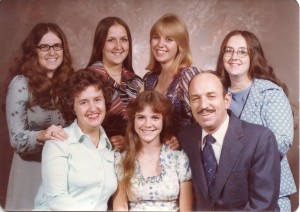 When we think of Blended Families, we think of two people who have both been divorced, who have children, that marry each other, and become a blended family. That is one type of blended family for sure, just like the old movie, “Yours, Mine, and Ours.” But in reality, every family is a blended family. I suppose people, who have never been divorced, would argue that point with me, but it is true nevertheless. If you think about it there is no other way to have families, except blending.
When we think of Blended Families, we think of two people who have both been divorced, who have children, that marry each other, and become a blended family. That is one type of blended family for sure, just like the old movie, “Yours, Mine, and Ours.” But in reality, every family is a blended family. I suppose people, who have never been divorced, would argue that point with me, but it is true nevertheless. If you think about it there is no other way to have families, except blending.
In my family, starting with my four sisters and me, we all started out as Spencer girls, but we did not carry that name into adulthood. We now have the names Masterson, Schulenberg, Reed, Stevens, and Hadlock. We also have Beach, Harman, Balcerzak, Davidson, Cossabone, Chase, Renville, Reynolds, Thompson, Spethman, Petersen, Royce, Spicer, Franco-Arizola, Smiley, Sawdon, Carroll, and Moore, and that is just on my side of my family, and just so far. On Bob’s side, the Schulenberg kids have added, Cook, Spencer, Parmely, Franklin, Petersen, Royce, Moore, Griffith, Wages, Eighmy, Birky, and Iverson. If that isn’t family blending…well, I don’t know what is. I just don’t think that type of blending is what people had in mind when they talk about blended families, but this type of family blending takes place far more often that the other type. It happens with every marriage.
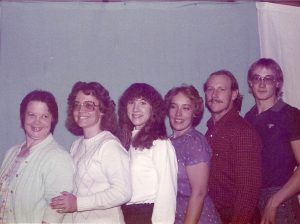 Bob and I have laughed about the fact that after years of being married, we now find out that we are distant cousins, but when you think about it, with all of the blending going on in this world, what is the likelihood that we would never marry a distant cousin. Pretty slim I’d say. In fact, I think that if I looked back in the ancestry of any random couple, I would find a cousinship somewhere back there. Of course, I wouldn’t even have to look very far, because the whole thing started with Adam and Eve, so since we are all related back there, is just stands to reason that the connections on the way back to Adam and Eve would also have connections. So, the next time you think about a blended family, you might think of your own family blending.
Bob and I have laughed about the fact that after years of being married, we now find out that we are distant cousins, but when you think about it, with all of the blending going on in this world, what is the likelihood that we would never marry a distant cousin. Pretty slim I’d say. In fact, I think that if I looked back in the ancestry of any random couple, I would find a cousinship somewhere back there. Of course, I wouldn’t even have to look very far, because the whole thing started with Adam and Eve, so since we are all related back there, is just stands to reason that the connections on the way back to Adam and Eve would also have connections. So, the next time you think about a blended family, you might think of your own family blending.

 Over the years, my family and I have spent many vacations and weekend trips, especially the 4th of July, in the Black Hills of South Dakota. We love the area, and it’s close enough to home to get there even for a three day weekend. Bob and I mostly love to hike the many trails there, as opposed to the tourist attractions, since we have been there many times. Nevertheless, there are a few places that we usually go and things we usually do, like the 1880 Train, Keystone, and of course, Mount Rushmore. Being patriots, Bob and I are very much impressed by the carvings on Mount Rushmore. I think most people know that four United States Presidents, who were instrumental in making this country great, are carved in the granite face of the mountain. If you go there, you will see, President George Washington, President Thomas Jefferson, President Theodore Roosevelt, and President Abraham Lincoln, looking out across the land, making a majestic tribute to these men and to our nation as a whole. These four presidents were chosen because they represent the first 130 years of American history well. These presidents were selected by Borglum because of their role in preserving the Republic and expanding its territory. I can’t go there, or even drive by the monument, without feeling a deep sense of pride
Over the years, my family and I have spent many vacations and weekend trips, especially the 4th of July, in the Black Hills of South Dakota. We love the area, and it’s close enough to home to get there even for a three day weekend. Bob and I mostly love to hike the many trails there, as opposed to the tourist attractions, since we have been there many times. Nevertheless, there are a few places that we usually go and things we usually do, like the 1880 Train, Keystone, and of course, Mount Rushmore. Being patriots, Bob and I are very much impressed by the carvings on Mount Rushmore. I think most people know that four United States Presidents, who were instrumental in making this country great, are carved in the granite face of the mountain. If you go there, you will see, President George Washington, President Thomas Jefferson, President Theodore Roosevelt, and President Abraham Lincoln, looking out across the land, making a majestic tribute to these men and to our nation as a whole. These four presidents were chosen because they represent the first 130 years of American history well. These presidents were selected by Borglum because of their role in preserving the Republic and expanding its territory. I can’t go there, or even drive by the monument, without feeling a deep sense of pride 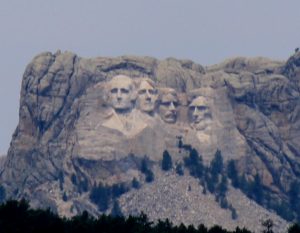 and awe. It’s almost like you can feel history when you are there.
and awe. It’s almost like you can feel history when you are there.
On March 5, 1925, the Governor of South Dakota, Carl Gunderson signed the Mount Harney bill, which would allow the carving of a monument in Custer State Park. The mountain was chosen as the sight for the carvings by Gutzon Borglum, the artist in charge of the project, and really the visionary of what it would become. It was dedicated on October 1, 1925, as the sight for the carving that South Dakota state historian Doane Robinson first dreamed of seeing in the Black Hills, back in 1923. On October 7, 1927, the actual carving began. The project took 14 years and 400 men to complete the carving of the mountain. The conditions were harsh and dangerous, yet no one died during the project. Over 90% of Mount Rushmore was carved using dynamite. That is probably one of the facts about Rushmore that most people find most intriguing. The blasts removed approximately 450,000 tons of rock. If you walk on the President’s Trail, you can still see the drill marks used for the dynamite. The fine details were finished with jackhammers and hand chisels. It really isn’t what you would have expected at all.
George Washington was dedicated on July 4, 1930. Then work began on Thomas Jefferson, but many people thought it was Martha Washington for a time…a drawback of an artists work being done so much in the 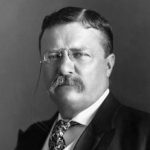
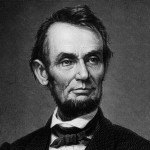 public eye. Thomas Jefferson was dedicated on August 30, 1936. Abraham Lincoln was dedicated on this day, September 17, 1937, and Theodore Roosevelt was dedicated on July 2, 1939. The Hall of Records was never finished because of dangerous working conditions. Gutzon Borglum died suddenly on March 6, 1942, and the work on the mountain was finished by his son, Lincoln Borglum. With the onset of the US involvement in World War II, the mountain was declared complete on October 31, 1941. So ended the work on the mountain, and I really never get tired of hearing the story.
public eye. Thomas Jefferson was dedicated on August 30, 1936. Abraham Lincoln was dedicated on this day, September 17, 1937, and Theodore Roosevelt was dedicated on July 2, 1939. The Hall of Records was never finished because of dangerous working conditions. Gutzon Borglum died suddenly on March 6, 1942, and the work on the mountain was finished by his son, Lincoln Borglum. With the onset of the US involvement in World War II, the mountain was declared complete on October 31, 1941. So ended the work on the mountain, and I really never get tired of hearing the story.
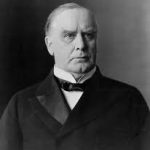 I find it very sad to think that if a person had some ailments or injuries in this day and age, they would likely have lived through the episode, but in days gone by, and for President McKinley, that was not to be the case.
I find it very sad to think that if a person had some ailments or injuries in this day and age, they would likely have lived through the episode, but in days gone by, and for President McKinley, that was not to be the case.
On September 6, 1901, while standing in a receiving line at the Pan-American Exposition in Buffalo, New York, McKinley was approached by Leon Czolgosz, a Polish-American anarchist carrying a concealed .32 revolver in a handkerchief. Czolgosz shot McKinley twice at close range. One bullet deflected off a suit button, but the other entered his stomach, passed through the kidneys, and lodged in his back. When he was operated on, doctors failed to find the bullet. That in and of itself was a very 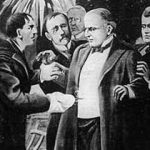 serious situation, but I believe it would have been survivable. Unfortunately for President McKinley, the doctors of that time had few, if any antibiotics to fight infection, and gangrene soon spread throughout the president’s body. McKinley died eight days later, on September 14, 1901. Czolgosz was convicted is of murder and executed soon after the shooting.
serious situation, but I believe it would have been survivable. Unfortunately for President McKinley, the doctors of that time had few, if any antibiotics to fight infection, and gangrene soon spread throughout the president’s body. McKinley died eight days later, on September 14, 1901. Czolgosz was convicted is of murder and executed soon after the shooting.
These days, there have been a number of people who have had injuries far more grave than President McKinley had, and yet they have come through with flying colors. I think it is irrelevant what a person’s politics are or whether you think President McKinley was a good president or a bad president, because this really isn’t about politics at all. The reality is that this man died largely because of a lack of modern medicines that could 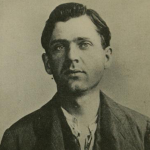 have easily cured the gangrene he had from the shooting, or in most cases, prevented it all together.
have easily cured the gangrene he had from the shooting, or in most cases, prevented it all together.
None of us likes to pay for the cost of some of the life-saving drugs that have been developed, but it is partly that cost that helps to pay for the research that goes into these new medicines. Whether we pay for them by donations before development or cost after development, really makes no difference. I know many people think that the drug companies gouge the patient, and I suppose that could be true to an extent, but which one of us has what it takes to find a medicine that cures some of the diseases we can cure today, that were a death sentence in years gone by?
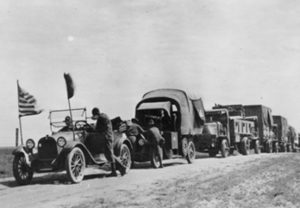
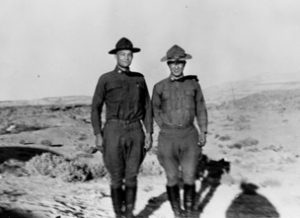 Have you ever wondered how the Interstate road system got started? People didn’t just wake up one day and envision a great system of roads that could transport us from one side of the country to the other. There had to be some reasons to do such a thing, right? Well, there was. In 1919, Dwight Eisenhower was feeling a bit disenchanted with life, because his wife and infant son were living 1,500 miles away in Denver, while he was a 28 year old lieutenant colonel stationed at Maryland’s Camp Meade. He was bored and miserable, and so he and his fellow soldiers wasted the hours playing bridge and complaining about being kept stateside during World War I. What do people do when they need to break through the boredom…what else, a road trip!!
Have you ever wondered how the Interstate road system got started? People didn’t just wake up one day and envision a great system of roads that could transport us from one side of the country to the other. There had to be some reasons to do such a thing, right? Well, there was. In 1919, Dwight Eisenhower was feeling a bit disenchanted with life, because his wife and infant son were living 1,500 miles away in Denver, while he was a 28 year old lieutenant colonel stationed at Maryland’s Camp Meade. He was bored and miserable, and so he and his fellow soldiers wasted the hours playing bridge and complaining about being kept stateside during World War I. What do people do when they need to break through the boredom…what else, a road trip!!
Eisenhower heard that two volunteer tank officers from Camp Meade were needed to participate in a coast to coast military convoy to San Francisco. It was the perfect adventure, so Eisenhower immediately volunteered his services. Granted, it wasn’t the thrill of battle that the young soldier had planned to spend his time in the service engaging in, but it was far better than playing bridge. Little did he know just how grueling the trip would be. Remember that these were the early years of the automobile, and drivers were just as likely to encounter roads to nowhere, as they were the open road. Highways were not usually paved. Dirt roads could be a muddy mess or so dry that they were either dust clouds or full of ruts. Sixty miles an hour was unheard of and many roads could only be driven at the pace of a brisk walk. As a means of transporting military equipment quickly from one coast to the other…this system left much to be desired, in fact it was a miserable excuse for a road system at all. Something had to change.
Fast forward a few years…37 years to be exact, and you will find then President Dwight D Eisenhower signing the Federal-Aid Highway Act of 1956 privately, without ceremony, on June 29, 1956. The system would take decades to build, and in reality is always under construction. The project was the largest public works project in American history. The project would pour billions of dollars into the nation’s economy all over the country, putting many people to work. Today, it continues to be a boon to the economy because of the maintenance and repairs needed to keep it going.
In 1990, as a tribute to Eisenhower, on the centennial of his birth, President George H W Bush redesignated the 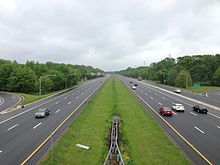
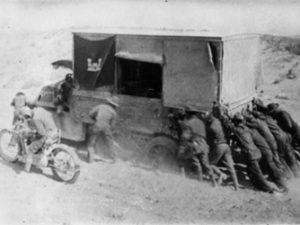 interstate system as the Dwight D Eisenhower National System of Interstate and Defense Highways. Interstate 80, would be quite familiar to Eisenhower. It starts just across the Hudson River from New York City, then goes through New Jersey and Pennsylvania, and into Ohio, where it follows generally the route of the 1919 Army convoy to San Francisco that had sparked Eisenhower’s interest in such a system in the first place.
interstate system as the Dwight D Eisenhower National System of Interstate and Defense Highways. Interstate 80, would be quite familiar to Eisenhower. It starts just across the Hudson River from New York City, then goes through New Jersey and Pennsylvania, and into Ohio, where it follows generally the route of the 1919 Army convoy to San Francisco that had sparked Eisenhower’s interest in such a system in the first place.
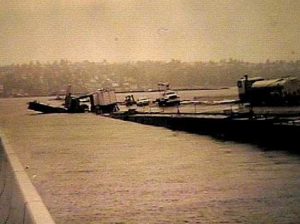 Since my daughter, Amy Royce and her family moved to Western Washington State, I keep coming across historic facts about the area. Of course, they were there before, but probably just didn’t grab my interest then. One such fact is that Seattle was home to the world’s first floating concrete bridge. Washington governor Clarence Martin and Lacey V Murrow, the Washington Toll Bridge Authority director, broke ground on the Lake Washington Bridge in December of 1938. The Lake Washington Floating Bridge was also known as the Mercer Island Bridge, it spanned Lake Washington from Seattle on the west to Bellevue to the east. The bridge was renamed Murrow Bridge in honor of Lacey Murrow in 1967. The bridge was a project financed by the Public Works Administration to give work to
Since my daughter, Amy Royce and her family moved to Western Washington State, I keep coming across historic facts about the area. Of course, they were there before, but probably just didn’t grab my interest then. One such fact is that Seattle was home to the world’s first floating concrete bridge. Washington governor Clarence Martin and Lacey V Murrow, the Washington Toll Bridge Authority director, broke ground on the Lake Washington Bridge in December of 1938. The Lake Washington Floating Bridge was also known as the Mercer Island Bridge, it spanned Lake Washington from Seattle on the west to Bellevue to the east. The bridge was renamed Murrow Bridge in honor of Lacey Murrow in 1967. The bridge was a project financed by the Public Works Administration to give work to  unemployed Washingtonians and to make the towns across the lake from Seattle more accessible to suburban development.
unemployed Washingtonians and to make the towns across the lake from Seattle more accessible to suburban development.
When the finished bridge opened in 1940, the Seattle Times called it “the biggest thing afloat.” It’s hard to imagine that 100,000 tons of steel, could float on more than 20 hollow concrete pontoons, and carry 5,000 cars per day. By 1989 the number of cars grew to 10,000 cars. Since the bridge would become such an important road between the two cities, the flood of November 1990 was especially devastating, in that it completely destroyed the bridge. While the bridge was closed for repairs, construction workers punched giant holes in the pontoons that kept it afloat and went home for the weekend.  A few days of rain and high winds filled the pontoons with water, and the broken bridge sank.
A few days of rain and high winds filled the pontoons with water, and the broken bridge sank.
This would not be an easy fix. As the pontoons filled with water and the bridge sank, it pulled about a half a mile of highway into the lake. There was simply no way to fix it. The bridge would have to be rebuilt from scratch. In the end, it would take three years to rebuild at a total cost of $93 million. When the bridge reopened, it would complete the coast to coast Interstate 90. On this day, September 12, 1993, the rebuilt Lacey V Murrow Bridge opened. This bridge was the east bound lane of I-90 from Seattle to Bellevue. The westbound lane is on the Homer M Hadley Bridge, which was not destroyed by the flood.
 Fifteen years ago today, Americans were greeted with horror, as terrorism split the atmosphere of safety we had long enjoyed around our nation. I think most Americans had become comfortable, and even complacent about national security. Life was going along at almost a lazy Sunday afternoon pace. We were like small town kids, who thought that nothing ever happens in our town. How very wrong we were. Our world was about to be turned upside down.
Fifteen years ago today, Americans were greeted with horror, as terrorism split the atmosphere of safety we had long enjoyed around our nation. I think most Americans had become comfortable, and even complacent about national security. Life was going along at almost a lazy Sunday afternoon pace. We were like small town kids, who thought that nothing ever happens in our town. How very wrong we were. Our world was about to be turned upside down.
When the first plane hit the World Trade Center, I think most people thought it was a tragic accident. We simply couldn’t fathom the idea that a terrorist would be so horribly cruel as to hijack a plane full of innocent people and fly it straight into a building full of more innocent people. And yet, to our horror, that is exactly what these terrorists did. They operated the planes with no mercy and no feelings. They did not care about the lives they were taking or even about their own lives…in fact, they thought they were heroes for their actions, and that there would be great rewards in Heaven for them. Their complete shock as they entered Hell, must have been devastating.
 Their actions left our nation is shock and disbelief. We watch as the devastation unfolded before us, growing worse by the moment, our hearts and minds were assaulted, yet we could not look away. We watched, hoping that the people on the top floors could be saved…even after they began to fall or jump from the building, because the heat was more than they could take. We felt sick with each and every thud. We prayed over the rescuers, that they would be successful in getting people out, and that they would come out too. We watched in stunned disbelief as the towers fell, praying that after the first tower fell, that somehow, the second would remain standing…until it also fell. We became angry at the people who had done this, without provocation. Pure hate, of our beliefs, our prosperity, and our liberties, and that drove them to attack us.
Their actions left our nation is shock and disbelief. We watch as the devastation unfolded before us, growing worse by the moment, our hearts and minds were assaulted, yet we could not look away. We watched, hoping that the people on the top floors could be saved…even after they began to fall or jump from the building, because the heat was more than they could take. We felt sick with each and every thud. We prayed over the rescuers, that they would be successful in getting people out, and that they would come out too. We watched in stunned disbelief as the towers fell, praying that after the first tower fell, that somehow, the second would remain standing…until it also fell. We became angry at the people who had done this, without provocation. Pure hate, of our beliefs, our prosperity, and our liberties, and that drove them to attack us.
As the day went on, we watched in horror as more information came out. We knew that there were going to be 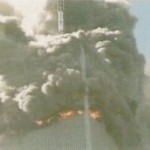 many people died, but still we watched as they dug through the rubble. We thought there would suddenly be people found alive in that rubble. As time went on, we knew that there wouldn’t be huge numbers of survivors. In the end, only twelve people were found alive after the towers fell. After a couple of days, we knew there would be no more, still we could not look away. We had to watch…had to know. As each lost one was found…we cried right along with their families. Then came the worst horror of all…finding out that some people would never be found. The fires had been so hot that their bodies were cremated. That added more horror to our thoughts. It was something we just couldn’t fathom, just like we could not fathom that 15 years later, that day would still be as vivid in our memories as it was on the day we were attacked.
many people died, but still we watched as they dug through the rubble. We thought there would suddenly be people found alive in that rubble. As time went on, we knew that there wouldn’t be huge numbers of survivors. In the end, only twelve people were found alive after the towers fell. After a couple of days, we knew there would be no more, still we could not look away. We had to watch…had to know. As each lost one was found…we cried right along with their families. Then came the worst horror of all…finding out that some people would never be found. The fires had been so hot that their bodies were cremated. That added more horror to our thoughts. It was something we just couldn’t fathom, just like we could not fathom that 15 years later, that day would still be as vivid in our memories as it was on the day we were attacked.
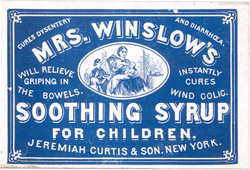 For as long as babies have been getting teeth, parents have been dealing with cranky babies. People have tried everything from a cold washcloth to alcohol. These days, there are other safe products that can be used, such as baby Tylenol, Motrin, or Ibuprofen, not to mention things like Numbs It. In years gone by, however, things were different. There were no real controls on medicines like there is today, and they didn’t know what ingredients could be harmful, or what might interact with other ingredients to cause serious problems.
For as long as babies have been getting teeth, parents have been dealing with cranky babies. People have tried everything from a cold washcloth to alcohol. These days, there are other safe products that can be used, such as baby Tylenol, Motrin, or Ibuprofen, not to mention things like Numbs It. In years gone by, however, things were different. There were no real controls on medicines like there is today, and they didn’t know what ingredients could be harmful, or what might interact with other ingredients to cause serious problems.
Inventors, and sometimes even housewives, came up with remedies that worked to ease the pain, and assumed that they had found the solution. Little did they know what problems they were causing down the road. Remedies like Doctor John’s Elixir, or some other such name, made by people with no training as a doctor, nurse, or even a pharmacist, and no control to  make sure they are safe. These formulas were often called “patent medicines” because they were over the counter medicines that were not patented, but were trademarked. One of the most famous was Mrs Winslow’s Soothing Syrup. In 1845, druggists Jeremiah Curtis and Benjamin A. Perkins, of Bangor, Maine, partnered to manufacture this remedy. It was said that Mrs Charlotte N Winslow, Curtis’ mother-in-law, created the formula while she was a nurse caring for infants. According to the label, the syrup could take away “teething pain, regulate the bowels, and was the best known remedy for dysentery and diarrhoea, whether arising from teething or other causes.”
make sure they are safe. These formulas were often called “patent medicines” because they were over the counter medicines that were not patented, but were trademarked. One of the most famous was Mrs Winslow’s Soothing Syrup. In 1845, druggists Jeremiah Curtis and Benjamin A. Perkins, of Bangor, Maine, partnered to manufacture this remedy. It was said that Mrs Charlotte N Winslow, Curtis’ mother-in-law, created the formula while she was a nurse caring for infants. According to the label, the syrup could take away “teething pain, regulate the bowels, and was the best known remedy for dysentery and diarrhoea, whether arising from teething or other causes.”
It all sounds wonderful…the perfect solution to all the baby’s ills, right? Wrong!! The two main ingredients were morphine and alcohol. Yes, it got rid of the pain, and pain medications cause constipation, so that took care of the other issues, but morphine is addictive at best, and deadly at worst, especially if the patient is given too much…which was a distinct possibility, given the fact that no one knew that morphine was addictive or deadly. Then add to it, alcohol…which shouldn’t be mixed with morphine, and you have a seriously dangerous drug. It’s not known exactly how many children became addicts and how many died, but it was used everywhere until it was denounced as dangerous in 1911 and even then, they still sold it until about 1930. Of course, medicines of today can be found to be dangerous, but much of the time, the medicines are tested for quite a while before they are released, and then most by prescription only…at least at first.
 When most of us think of submarines, we think of the modern day nuclear subs that are basically underwater mobile cities, but as we all know, submarines have been around a lot longer…just how long was a surprise to me, although a learned history buff might not have been shocked at all. The idea of being able to operate underwater, actually dates back to ancient times when people used a hollow stick to breathe underwater. I’m not sure how successful any of those early attempts were, especially in the use of a vehicle of some kind, but probably not successful enough to warrant any kind of mass production.
When most of us think of submarines, we think of the modern day nuclear subs that are basically underwater mobile cities, but as we all know, submarines have been around a lot longer…just how long was a surprise to me, although a learned history buff might not have been shocked at all. The idea of being able to operate underwater, actually dates back to ancient times when people used a hollow stick to breathe underwater. I’m not sure how successful any of those early attempts were, especially in the use of a vehicle of some kind, but probably not successful enough to warrant any kind of mass production.
The first documented record of a submarine being used in combat, came as quite a surprise to me. The submarine, named Turtle, but usually called American Turtle, was used during the American Revolutionary War in 1776. Turtle was built in Old Saybrook, Connecticut in 1775 by American, David Bushnell as a means of attaching explosive charges to ships in a harbor. Turtle was designed 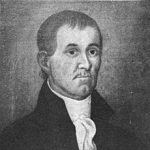 for use against British Royal Navy vessels occupying North American harbors. Then Connecticut governor, Jonathan Trumbull recommended the invention to George Washington. Even though Washington had his doubts, he provided funds and support for the submarine’s development and testing.
for use against British Royal Navy vessels occupying North American harbors. Then Connecticut governor, Jonathan Trumbull recommended the invention to George Washington. Even though Washington had his doubts, he provided funds and support for the submarine’s development and testing.
By 1776, Turtle was ready for testing. Several attempts were made by submarine operator, Sergeant Ezra Lee to affix explosives to the undersides of British warship HMS Eagle on September 7, 1776 in New York Harbor. Unfortunately, all of them failed, and Turtle’s transport ship was sunk later that year by the British…with Turtle aboard. Bushnell claimed to have recovered Turtle, but that has not been proven. Replicas of Turtle have been built and they are on display at the Connecticut River Museum, the U.S. Navy’s Submarine Force Library and Museum, the Royal Navy Submarine Museum and the 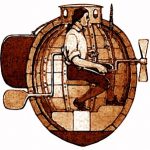 Oceanographic Museum in Monaco.
Oceanographic Museum in Monaco.
While Turtle was not successful, it was innovative, and it inspired other inventors to come up with ways that a submarine could be successful in combat, as well as exploration. I have to wonder if David Bushnell, or any of the other early inventors of crafts that operated under water had any idea how far below the surface of the oceans the submarine would eventually be able to go. Think of all the ships and planes that would never have been located, if we had no way to peer beneath the surface, and how much cargo would never have been recovered if we could not travel far below to not only locate, but salvage the cargo lost at sea. The submarine is truly amazing.

